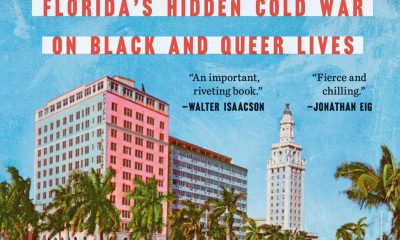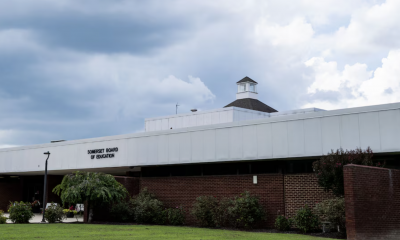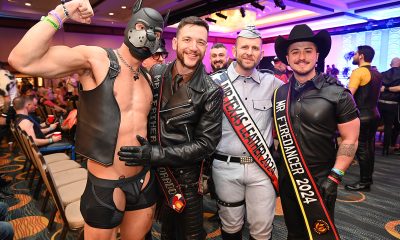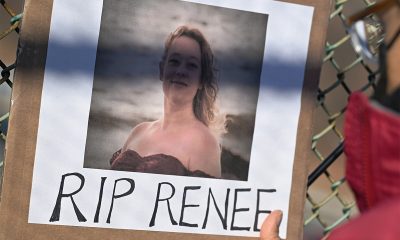Arts & Entertainment
Gearing up for ‘Change’
LGBT conference unfolds in Baltimore this weekend
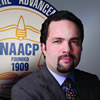
Not surprisingly, Rea Carey, executive director of the National Gay and Lesbian Task Force, is excited about the start of the 24th Creating Change conference, now underway in Baltimore.
This year, the Task Force expects a record-breaking crowd of about 3,000 LGBT activists and their allies to come together for a weekend of celebrating victories, analyzing losses and developing strategies for moving forward in the challenging political and social landscape of 2012.
“This conference is where many of us got our start as LGBT activists,” Carey says. “It brings together an amazingly diverse array of people from across the country and around the world.”
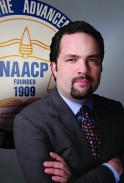
The NAACP’s Benjamin Jealous speaks at Creating Change in Baltimore this weekend. (Photo courtesy NAACP)
There are, for example, workshop tracks on aging, arts and culture, disability, community centers and community organizing, fundraising, legislative challenges and the 2012 elections, families, gender issues, campus mobilization, labor, religion, people of color, the transgender community and sexual freedom. In addition, the conference started with day-long skill-building and networking institutes and the first-ever Creating Change Lobby Day where activists traveled to Capitol Hill to brief their congressional delegations on the spectrum of issues facing gay and lesbian Americans.
Carey notes that two of the most active contingents this year are youth and elected officials. “We have a large contingent of young people who are working in their high schools and colleges and in their communities to create progressive change. We will also have more elected and appointed officials participating in the conference than we ever have before.”
Conference attendees come together for a series of plenary sessions emceed by lesbian comedian Kate Clinton. This year, the plenaries include a state-of-the-movement address by Carey, a panel on international issues moderated by Cary Alan Johnson of the International Gay and Lesbian Human Rights Commission, and a performance by gay actor and activist Wilson Cruz. Blade editor Kevin Naff moderates a panel on national politics with the Victory Fund’s Robin Brand, Equality Forum’s Malcolm Lazin and Equality Federation’s Rebecca Isaacs Friday at 3 p.m.
The highlight of this year’s conference is the keynote address by Benjamin Todd Jealous, president and CEO of the NAACP. Jealous comes from a long line of civil rights advocates and has become a straight ally in the fight for LGBT equality.
“We are deeply honored to have one of the best civil rights leaders in the country address us and I am sure he will be speaking from the heart,” Carey said.
Jealous has spoken movingly of the struggles faced by his gay brother, whom he describes as “the closest person to me in the world,” and remembers how they fought together against childhood bullies. Working with NAACP Chairman Emeritus Julian Bond, Jealous created a LGBT Equality Task Force at the NAACP to help the African-American community fight the challenges of homophobia and transgender discrimination.
Jealous and the national office of the NAACP were staunch opponents of Proposition 8, the anti-same-sex marriage measure in California, but Jealous notes that lack of outreach to the African-American community was in issue in the loss. At last year’s NAACP convention, Jealous said, “If folks really wanted to win on Prop. 8, and thought the black community was so important, then they should have started organizing outreach a lot sooner.” Instead, LGBT organizers “who came to the black community late” sent a message of disrespect.
Carey emphasizes that, “It is part of the value of the Task Force to partner with non-LGBT organizations as we seek justice and equality. The challenge for all of us is that we have a lot to learn from other movements and they have a lot to learn from us.”
The conference runs through Sunday at the Hilton Baltimore. Visit creatingchange.org for details.
Out & About
Love board games and looking for love?
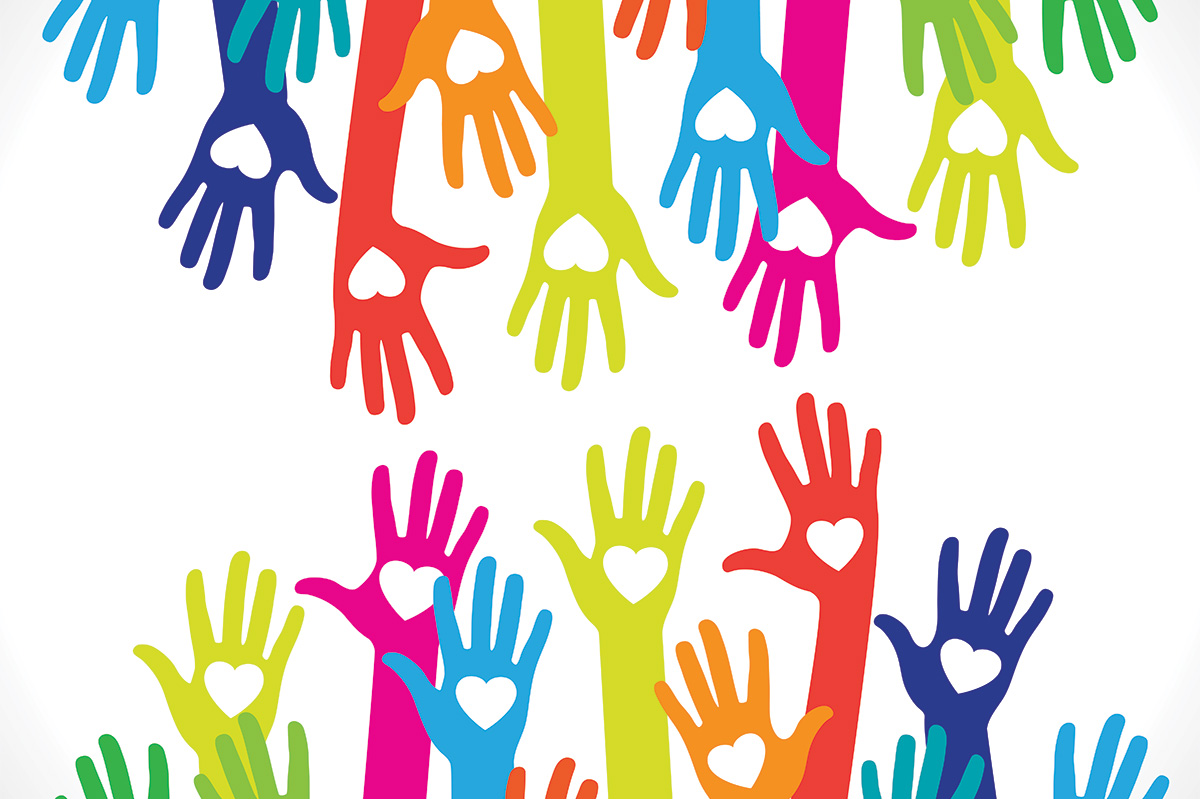
Quirk Events will host “Board Game Speed Dating for Gay Men” on Thursday, Jan. 22 at 7 p.m. at KBird DC.
Searching for a partner can be challenging. But board games are always fun. So what if you combined board games and finding a partner?
Picture this: You sit down for a night of games. A gaming concierge walks you through several games over the course of the night. You play classics you love and discover brand new games you’ve never heard of, playing each with a different group of fun singles. All while in a great establishment.
At the end of the night, you give your gaming concierge a list of the folks you met that you’d like to date and a list of those you met that you’d like to just hang out with as friends. If any two people put down the same name as each other in either column, then your gaming concierge will make sure you get each other’s e-mail address and you can coordinate a time to hang out.
Tickets cost $31.80 and can be purchased on Eventbrite.

Friday, January 16
Friday Tea Time will be at 12 p.m. at the DC Center for the LGBT Community. This is a social hour for older LGBTQ+ adults. Bring your beverage of choice. For more information, contact Mac ([email protected]).
Trans and Genderqueer Game Night will be at 7 p.m. at the DC LGBTQ+ Community Center. This is a relaxing, laid-back evening of games and fun. For more details, visit the DC Center’s website.
Go Gay DC will host “LGBTQ+ Social in the City” at 7 p.m. at Hotel Zena. This event is ideal for making new connections and community building or just to unwind and enjoy extended happy hour. Attendance is free and more details are available on Eventbrite.
Saturday, January 17
Go Gay DC will host “LGBTQ+ Community Brunch” at 11 a.m. at Freddie’s Beach Bar & Restaurant. This fun weekly event brings the DMV area LGBTQ+ community, including allies, together for delicious food and conversation. Attendance is free and more details are available on Eventbrite.
The DC LGBTQ+ Community Center and SMYAL will host a free film screening of “Mama Bears” celebrating queer youth, resilience, and the power of living authentically. Whether you’re a movie lover, looking to make new friends, or simply want a safe, affirming space to relax, this event is for you. Click this link to RSVP.
LGBTQ People of Color will be at 7 p.m. on Zoom. This peer support group is an outlet for LGBTQ people of color to come together and talk about anything affecting them in a space that strives to be safe and judgement free. There will be all sorts of activities like watching movies, poetry events, storytelling, and just hanging out with others. For more details, visit thedccenter.org/poc or facebook.com/centerpoc.
Sunday, January 18
Go Gay DC will host “LGBTQ+ Community and Conversation” at noon at As You Are. This event is for those looking to make more friends and meaningful connections in the LGBTQ+ community. Look for the Go Gay DC sign on the long table near the front window. Attendance is free and more details are available on Eventbrite.
Monday, January 19
“Center Aging: Monday Coffee Klatch” will be at 10 a.m. on Zoom. This is a social hour for older LGBTQ adults. Guests are encouraged to bring a beverage of choice. For more information, contact Adam ([email protected]).
Tuesday, January 20
Center Bi+ Roundtable will be at 7 p.m. on Zoom. This is an opportunity for people to gather in order to discuss issues related to bisexuality or as Bi individuals in a private setting.Visit Facebook or Meetup for more information.
Tae Kwon Do Class with Avi Rome will be at 12:30 p.m. This inclusive and beginner-friendly class, led by Instructor Avi Rome, offers a light warm-up, stretching, and instruction in basic techniques, patterns, and striking padded targets. Each session is designed to be adaptable for all ability and mobility levels, creating a welcoming space for everyone to build strength, confidence, and community through martial arts. For more details, visit the DC Center’s website.
Wednesday, January 21
Job Club will be at 6 p.m. on Zoom upon request. This is a weekly job support program to help job entrants and seekers, including the long-term unemployed, improve self-confidence, motivation, resilience and productivity for effective job searches and networking — allowing participants to move away from being merely “applicants” toward being “candidates.” For more information, email [email protected] or visit thedccenter.org/careers.
Thursday, January 22
The DC Center’s Fresh Produce Program will be held all day at the DC Center for the LGBT Community. People will be informed on Wednesday at 5 p.m. if they are picked to receive a produce box. No proof of residency or income is required. For more information, email [email protected] or call 202-682-2245.
Virtual Yoga Class will be at 7 p.m. on Zoom. This free weekly class is a combination of yoga, breathwork and meditation that allows LGBTQ+ community members to continue their healing journey with somatic and mindfulness practices. For more details, visit the DC Center’s website.

The Washington Capitals will host Pride Night on Saturday, Jan. 17, when they host the Florida Panthers at Capital One Arena. A special ticket offer featuring a Pride-themed Capitals rainbow jersey is available at washcaps.com.
Fans are invited to a pre-game Block Party at District E beginning at 5 p.m. The event will feature a performance by the band NovaKane. Specialty happy hour food and beverages will be available, as well as giveaways. There will also be a presence by several local LGBTQ+ community organizations.
-

 Theater5 days ago
Theater5 days agoFord’s ‘First Look’ festival showcases three new productions
-

 Bars & Parties5 days ago
Bars & Parties5 days agoMid-Atlantic Leather kicks off this week
-

 U.S. Supreme Court3 days ago
U.S. Supreme Court3 days agoSupreme Court hears arguments in two critical cases on trans sports bans
-

 Photos4 days ago
Photos4 days agoPHOTOS: ‘ICE Out For Good’ Sunday protests

